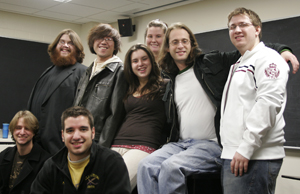
Binghamton University has an Ivy-caliber debate team, without the Ivy funding.
BU’s debate team is ranked among the best in the nation, but receives a fraction of the resources the schools they compete against do.
The team’s captain, Sebastian Rodriguez, said that the team gets very little money from the Student Association, which makes things difficult during tournaments.
‘A lot of the other teams stay at certain hotels during a tournament but we have to stay at local motels because we just can’t afford it,’ Rodriguez said. ‘Even though some of our competitors sympathize with us, we still get a bad reputation because we have no resources.’
The SA’s budget is created by the financial council, which uses the previous year’s budget and performance and the group’s explanation of how they will use the money the next year to determine how much each group will receive. The budget then has to be approved by the assembly before it can be finalized.
According to Chris Powell, vice president for finance of the SA, the team is given $14,000, which is an increase from the amount it received last year.
‘The Binghamton debate team is one of the best performing clubs and that is why their funding has increased each year, but unfortunately there are limitations that the SA has,’ Powell said.
Although President Lois B. DeFleur has also given the team an additional $2,000 this year, the amount only covers one additional tournament.
The lack of funding also presents a problem when the team travels to national tournaments in places like Georgia and California.
‘Ivy League schools have an elitist attitude; the administration at Binghamton has shown some support but it is not enough,’ Joe Schatz, the team’s coach, said. ‘Northwestern uses twice the amount of their budget for one national tournament than we have for one whole year.’
The team has to take money out of their own pockets if they want to go to these kinds of tournaments.
‘It’s a slow and tedious process to get the financial support we need,’ Schatz asserted.
This money, along with funding received from their relatively new alumni base ‘ the team was formed in 1980 ‘ has limited the team to mostly competing regionally, and may affect their ability to keep their ranking.
The debate team engages in policy debate, where teams of two argue on a certain policy being passed. This season’s topic is whether or not the U.S. federal government should increase its engagement with the governments of Afghanistan, Iran, Lebanon, the Palestinian Authority and Syria.
The team’s next tournament will be Nov. 10 at Wake Forest University.


